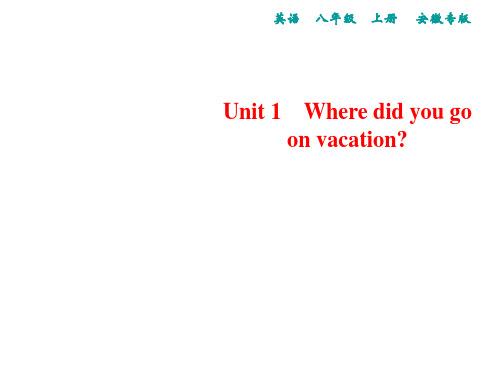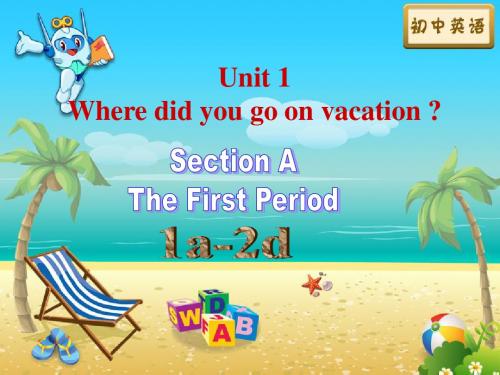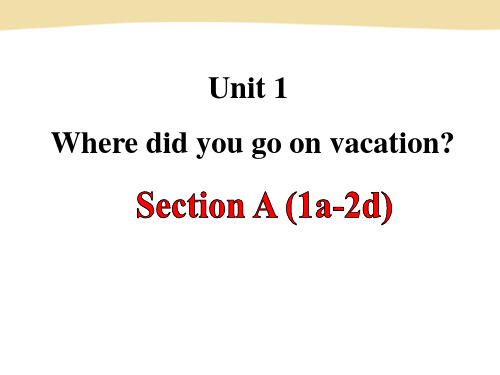人教版英语八年级上册 Unit1 Section A 经典高清课件
合集下载
秋人教版英语八年级上册(安徽专版)习题课件:Unit 1 Section A (1a2d)3

4.wonderful adj.精彩的;绝妙的 eg: have a wonderful time玩得髙兴 【拓展】 wonder n.奇迹 v.想知道 eg: The Great Wall is one of the seven wonders in the world. 长城是世界上的七大奇迹之一。 5.quite a few “相当多;不少” ,修饰复数名词。 【拓展】 few“不多,很少”,表示否定;a few“有几个”,表示肯定, 都修饰可数名词;而little“很少;不多”,表示否定;a little“一点儿”, 表示肯定,都修饰不可数名词。
Ⅱ、从方框里选择适当的单词填空。
something,anything,nothing,everyone,someone,anyone 6.Ben is new here,so they know nothing about him. 7.—Is everyone here today? —Yes,we're all here. 8.There's nothing interesting in today's newspaper.It's boring. 9.Why not ask someone to go swimming with you? 10.Does anyone know when we will have a Chinese test?
• You have to believe in yourself. That's the secret of success. 人必须相信自己,这是成功的秘诀。
•
( D )13.Mr.Green saw ________ students in the park.
人教版英语八年级上册 Unit 1Section A Grammar Focus课件

Unit 1 Where did you go on vacation?
Section A Grammar Focus
Warming-up Presentation
Practice Production Summary
Teaching aims
1. 掌握一般过去时的疑问结构。 2. 能够掌握不定代词的用法。 3. 能够熟练运用目标语言谈论发生在假期的外出旅游经历。
Warming-up Warming-up Presentation Practice Production Summary
Complete the questions. Answer for your last vacation.
Where did you visit for your last vacation? I visited (the seaside). Did you like the seaside? Yes, I did. (No, I didn’t.) Where ___ you go for your last vacation? _________________________________ Did you ___ it? _________________________________
Grace, where did you go on vacation?
I went to New York City.
Warming-up Presentation
Practice Production Summary
【一般过去时】一般疑问句(实意动词作谓语): Did + 主语 + 动词原形 + 其他? 简答语:Yes, ... did. / No, ... didn’t.
Section A Grammar Focus
Warming-up Presentation
Practice Production Summary
Teaching aims
1. 掌握一般过去时的疑问结构。 2. 能够掌握不定代词的用法。 3. 能够熟练运用目标语言谈论发生在假期的外出旅游经历。
Warming-up Warming-up Presentation Practice Production Summary
Complete the questions. Answer for your last vacation.
Where did you visit for your last vacation? I visited (the seaside). Did you like the seaside? Yes, I did. (No, I didn’t.) Where ___ you go for your last vacation? _________________________________ Did you ___ it? _________________________________
Grace, where did you go on vacation?
I went to New York City.
Warming-up Presentation
Practice Production Summary
【一般过去时】一般疑问句(实意动词作谓语): Did + 主语 + 动词原形 + 其他? 简答语:Yes, ... did. / No, ... didn’t.
2019-2020年人教统编八年级英语上册 unit 1 where did you go on vacation period 1 section a(1a-2d课件

On vacation, Tina went to the mountains. She thinks it was … Xiang Hua … He thinks it was…
2a Listen: Where did the people go on vacatiid she go on vacation ? She stayed at home and watched TV .
Where did they go on vacation ? They went to the beach . Where did they go on vacation ? They went to the
Name
Activities
Tina Xiang Hua
went to the mountains went to New York City
Sally
stayed at home
Brad
visited his uncle
Tom
went to summer camp
Report like this:
Park
Where did they go on vacation?
They went to a park.
• Where did Lily go on vacation?
• She went shopping.
Read :
Where did he go on vacation ? He went to New York City .
Girl: And where did you go, Brad?
Brad: I visited my uncle.
Conversation 3
最新人教版英语八年级上册Unit 1 Where did you go on vacation Section A(1a-2d)公开课PPT课件

I went to Beijing City.
Where did he go on vacation?
He went to the mountains.
Where did she go on vacation?
She went to the beach.
Where did they go on vacation?
2a Listen. Where did the people go on vacation? Complete the chart. People Grace Kevin Julie Places New York City
a Beijing Hutong
Shanghai
Where did you go on vacation?
I went to the Great Wall.
Where did she go on vacation?
She visited the USA.
She went to New York City.
2我去了山区。 3待在家里 4拜访我叔叔 5去夏令营 6去海边 7参加博物馆 8买一些特殊的东西
9 为考试复习 10和别人一起出去
11去中央公园
Step 1 准备与热身(Preparation)
the Great Wall the Palace Museum
Beijing
Tain'anmen Square
went to the mountains with my family. Tina: I ____________ have a good time XH: Did everyone ______________? Tina: Yes. Everything was excellent.
人教版新目标八年级英语上册Unit1 Section A课件

中。 • any one 指某些人或事物中的任何一个, • 常与of 短语连用。作主语,谓语动词用单数。
• Any one of the books is interesting. • 这些书中任何一本都有趣。
Rick: Hi,Helen. Long time no see.
Helen: Hi,Rick. Yes, I was on vacation last month.
5 不定代词+形容词 something interesting
巩固练习:用不定代词或不定副词填空
1. I can’t hear anything = I can hear __n_o_t_h_in_g__.
2. There is _s_o_m_e_t_h_in_g__ on the floor. Please pick
stop
再加-ed
trip
stopped tripped
以“辅音字母+y”的动词,先 study
变“y”为“ i”再加-ed
worry
studied worried
am(is) →was
are →were
肯定句:主语 + was/were + 其他
He was at home yesterday.
我要拜访奶奶
visiபைடு நூலகம் 动词1拜访,看望, 后接表示人的名词或代词。 2参观,游览,后接表示地点的名词。 visit名词意为 “访问,参观,拜访"
my first visit to China
第一次到中国参观
visitor 参观者,游客
1. Tina 2. Xiang Hua
1b Listening 3.Sally 4. Bob 5. Tom
• Any one of the books is interesting. • 这些书中任何一本都有趣。
Rick: Hi,Helen. Long time no see.
Helen: Hi,Rick. Yes, I was on vacation last month.
5 不定代词+形容词 something interesting
巩固练习:用不定代词或不定副词填空
1. I can’t hear anything = I can hear __n_o_t_h_in_g__.
2. There is _s_o_m_e_t_h_in_g__ on the floor. Please pick
stop
再加-ed
trip
stopped tripped
以“辅音字母+y”的动词,先 study
变“y”为“ i”再加-ed
worry
studied worried
am(is) →was
are →were
肯定句:主语 + was/were + 其他
He was at home yesterday.
我要拜访奶奶
visiபைடு நூலகம் 动词1拜访,看望, 后接表示人的名词或代词。 2参观,游览,后接表示地点的名词。 visit名词意为 “访问,参观,拜访"
my first visit to China
第一次到中国参观
visitor 参观者,游客
1. Tina 2. Xiang Hua
1b Listening 3.Sally 4. Bob 5. Tom
八年级英语上册《Unit1_How_often_do_you_exercise?》SectionA课件_人教新目标版[1]
![八年级英语上册《Unit1_How_often_do_you_exercise?》SectionA课件_人教新目标版[1]](https://img.taocdn.com/s3/m/04dddd680b1c59eef8c7b4fe.png)
I hardly ever play football. He always plays football. I sometimes go to KFC.
She never goes to KFC.
-- What do you usually do on weekends? --I usually… • watch TV
surf the Internet
Do you know their difference?
• sometime • some time • sometimes • some times 某个时间 一段时间 有时 几次
I sometimes go to school by bus. I will go to America sometime this year. I have been to the Great Wall for some times. I watched TV for some time last night.
根据提示完成下面问题。
1. We drink milk every day.
How often do you drink milk? (对划线部分 _________
提问。)
2. ---How often do you play football?
--- _________. (选出正确答案)
A. Once a week C. Very well B. In the evening D. Twice
Let’s try!
• 根据汉语提示完成句子.每空词数不限.
• 1.你多长时间看望一次祖父母? How often your grandparents • __________ do you see ________________? • 2.他的爷爷每天都做运动. exercises every day • His grandpa ______________________. • 3.我每周购物两次. twice a week • I shop _________________. • 4.我喜欢读书.我每天都读英语. reading read English • I like __________. I _____________every day. • 5.-周末你通常做什么?网上冲浪. do you usually do on weekends What _______________? _________________. Surf the Internet •
She never goes to KFC.
-- What do you usually do on weekends? --I usually… • watch TV
surf the Internet
Do you know their difference?
• sometime • some time • sometimes • some times 某个时间 一段时间 有时 几次
I sometimes go to school by bus. I will go to America sometime this year. I have been to the Great Wall for some times. I watched TV for some time last night.
根据提示完成下面问题。
1. We drink milk every day.
How often do you drink milk? (对划线部分 _________
提问。)
2. ---How often do you play football?
--- _________. (选出正确答案)
A. Once a week C. Very well B. In the evening D. Twice
Let’s try!
• 根据汉语提示完成句子.每空词数不限.
• 1.你多长时间看望一次祖父母? How often your grandparents • __________ do you see ________________? • 2.他的爷爷每天都做运动. exercises every day • His grandpa ______________________. • 3.我每周购物两次. twice a week • I shop _________________. • 4.我喜欢读书.我每天都读英语. reading read English • I like __________. I _____________every day. • 5.-周末你通常做什么?网上冲浪. do you usually do on weekends What _______________? _________________. Surf the Internet •
2014年秋人教版八年级英语上Unit1 Section A-2课件
No, no one was here. Everyone was on vacation. Yes, I bought something for my father.
No, I bought nothing. Oh, yes. Everything was excellent.
3a Fill in the blanks with the words in the box and practice the conversation.
anyone Linda: Did you go with__________?
Alice: Yes, I did. I went with my sister. Linda: Did you go shopping? Alice: Of course! I bought__________ something for my nothing parents, but _________for myself. Linda: Why didn’t you buy__________ anything for yourself? anything liked. Alice: I didn’t really see ____________I
__________ nothing seemed to be bored. Bye for
now!
Mark
3c Ask your group questions about their last vacation. Then tell the class your results.
Did you…
anyone something anything everything nothing Linda: Did you do________ anything fun on your vacation, Alice? Alice: Yes, I did. I went to Sanya. Linda: How did you like it? everything Alice: Well, it was my first time there, so_____________ was really interesting.
八年级英语上册Unit1第一课时SectionA(1a_2d)课件新版人教新目标版ppt
三、单项选择。 ( B )11.________ can use sharedbicycle(共享单车) in our city if he or she wants. A.Someone B.Anyone C.No one D.You ( B )12.—________ did you go last summer on vacation? —To New York city. A.When B.Where C.How D.Why
a good time. 4.Quite a __fe_w__(不少) students have iPads in my class. 5. Most (大多数) of the students like Friday because they don't go to
school the next day.
( C )13.—Would you like some more dumplings? —Yes,just ________,please. A.a little B.little C.a few D.few ( C )14.—Is there ________ in today's newspaper? —Yes, there is. There is a report about the big fire. A.something new B.new something C.anything new D.new anything
( B )15.—Did you go to Central Park yesterday?
—________. I did my homework at home. A.Yes, I did B.No, I didn't C.Yes, I was D.No, I wasn't
2014年秋季人教版八年级英语上Unit 1 Section A 3a--3c课件
• 我们喂母鸡吃食,还看到了一些小猪。 • We fed some hens and saw some baby pigs. • 他们是如此可爱。 • They were so cute! • 唯一的问题是晚上除了读书没什么事可做 。 • The only problem was that there was nothing much to do in the evening but read. • (即使这放在其 后面。例如: 这本书里有什么新东西吗? Is there _________ anything _____ new in this book? 今天没有什么特别的事。 There’s _________ nothing ________ special today.
3.No one seemed to be bord. 没有人好像无聊。 1)翻译:___________________ 2)Seem是系动词,意为__________, 似乎,好像 其用法如 下: a.seem +(to be )名词/形容词(作表语) He seems to be happy. b.Seem +to do sth. The students seemed to understand the word. c.It seems that从句。 It seems that he is happy.
4. 不,没有别人在这儿。每个人都在度假。 No. ____ No _____ one was here. ________ was on ________. Everyone vacation 5. 你买了什么特别的东西了吗? _____ Did you buy ________ anything _______? special 6. 是的,我为我爸爸买了些东西。 Yes, I _______ bought _________ something for my father. 7. 不,我没有买什么东西。 No, I _______ bought _________. nothing
2015-2016学年八年级英语上册 Unit 1 Where did you go on vacation(第1课时)Section A(1a-1c)课件
三、句型转换。
11.I was in the teacher's office just now.(改为一般疑问句,并作否定回 答) Were________ you —________ in the teacher's office just now? —________ No ,I ________. wasn't 12.I read my books last night.(改为一般疑问句) ________ you ________ Did read your books last night?
4.重要短语
stay at home 待在家里 go to the beach 到沙滩去
go to summer camp 参加夏令营
go to the mountains 去大山里 visit museums 参观博物馆
一、单项选择。
C 1.His family ________ the zoo last week. A.visit B B B.am visiting C.visited D.will visit 2.Where ________ you go on vacation? A.does B.did C.are D.were 3.She didn't ________ me about it.
英语。
2.camp的用法: (1)n.野营,营地
eg:a summer camp 一个夏令营
(2)v.宿营 eg:go camping 去宿营
3.Where did„?
“Where did„?”是一般过去时的特殊疑问句,did是助动词,在一
般过去时的句子中,在主语之前加did可构成疑问句,在主语之后,动词 之前加didn't可构成否定句,此时谓语动词用原形。
- 1、下载文档前请自行甄别文档内容的完整性,平台不提供额外的编辑、内容补充、找答案等附加服务。
- 2、"仅部分预览"的文档,不可在线预览部分如存在完整性等问题,可反馈申请退款(可完整预览的文档不适用该条件!)。
- 3、如文档侵犯您的权益,请联系客服反馈,我们会尽快为您处理(人工客服工作时间:9:00-18:30)。
[ˈsʌmwʌn] pron.某人 例句:Someone looked at the map.
diary 英[ˈdaɪəri] n.日记; 日记簿;
例句:Did you keep a diary? 你有没有坚持写日记的习惯?
根据句意和提示写出所缺单词 1. The sofa is terribly heavy. Can you move it by yourself ?
Section A 课文 Can you anwser? 1. Did Helen go anywhere interesting? Helen 有没有去比较有意思的地方呢? 2. Did reck do anything special? Rick有没有做一些特殊的事情呢?
Yes, she did. She went to Guizhou with my family. Not really. I just stayed at home most of the time to
yourself
[jɔːrˈself] yourselves 英[jɔːˈsɛlvz] pron.你自己; (用以加强语气) pron.(反身代词)你自己; 您自己; 例句:Why didn't you buy something for you ?
为什么你没给你自己买一些东西呢? 注意:英文里面你是yourself,复数形式你们 yourselves.是变f为v加es,同时注意读音。
Did you see Huangguoshu Waterfall?
Helen: Yes, I did. What about you? (3) B
Rick: Not really. I just stayed at home most of the time to read and relax.
(1)选择C选项。根据原文意思看,应该是说Rick和Helen 打 招呼,说好久不见,下面Helen 说是的,上个月我在度假. 听到 Helen 说的话不可能回答 A选项It was wonderful !这个 这句话的意思就变成好久Rick先打招呼,他听到Helen回答 后的反应是这么久不见太好了,越久不见面越好。根据文 章的语境排除A. C选项这句话有一个地点,所以这道题应该 选C。注意B,C容易混淆选错表面上都可选,但是B说的是 你去过什么有趣的地方吗?C说的是上个月你做过什么特别 的事吗?根据下文Helen 说她去了贵州推理出C说的地点符 合文意。
2. The movie is so boring. I feel bored
?
3. She kept man diary
last year.
Diary
4. I fell off my bike and hurt myself
yesterday.
解析
1. 这个沙发太沉了,你能搬动吗?move 本来是移动的意 思,在这句话里翻译成搬动更符合更符合中国人的表达思 路。这句话的意思是:这个沙发太沉了,我搬不动,你能 不能自己搬?主语用的you,你自己就是yourself . yourself 这里是反身代词,指代的是前面主语you。
例句:1.Did you go out with anyone?
你跟任何人出去玩了吗?
2.Does anyone else want to come? 还有人想来吗?
anywhere
[ˈeniweə(r)]
adv.(用于否定句和疑问句,代替somewhere) 在任何地
方; 在(或去)任何地方; 随便哪个地方;也是不定代词。
4. 这句话的意思是:我从我的自行车上摔了下来,弄伤 了自己。主语是 I ,所以应该用反身代词myself。
The physics problem is too hard, so
can work it out.
students
A. little B. few
C. a little
D. a few
(B)这句话的意思是:这个物理问题太难了所以几乎没有学 生计算出来。work out :计算出。四个选项都是初中阶段常考 知识点,要注意区分用法。a little 和little含义都是一点点。但 是却别在于a liitle :修饰不可数名词,a few :修饰可数名词。 little和few 代表的是否定含义,几乎没有,很少。根据题意这 个物理问题太难了,所以几乎没有学生计算出来,又因为 students是复数,修饰可数名词只有选B.
stayed at home
Activities
visited museums
went to summer camp
went to the bech
anyone
Words and expressions
英[ˈeniwʌn] 复合类型的词
(用于否定句、疑问句,也用于if或whether之后,或紧接 prevent、forbid、avoid等动词,代替someone) 任何人
例句:There's nothing interesting in the city. 在这个城市里没有什么有趣的东西。
Complete the dialogue with the sentences inthe box.
A. It was wonderful! B. Did you do anything special last month? C. did you go anywhere interesting?
2.这句话的意思是:这个电影太无聊了,我感到很厌烦。 这里应该填bored。这两个词注意区分用法,boring表示 “无聊,厌烦”,bored也表示“无聊,厌烦”。注意区 boring形容的是物,bored 形容的是人.
3.根据句子的图片可以知道要填的是日记,keep many diaries 就是坚持写日记的意思。many 可以修饰可数名 词,diary 虽然是日记的意思,但是这句话前面keep many, many 是复数形式, 所以我们填diaries ,diary 的 复数形式为diaries 。所以我们3题填diries。
few
[fjuː] adj.& pron. (与复数名词和复数动词连用)不多,很少;(与复数名词 和复数动词连用)有些,几个pron.很少人(或事物、 地方);有些(人、事物、地方);一些;不和…一般多;少 于 quite a few 相当多,不少 例句:We took quite a few photos there. 我在那里照了很多照片。
2d . Role-play the conversation. Rick:Hi, Helen. Long time no see. Helen: Hi, Rick. Yes, I was on vacation last month. Rick: Oh, did you go anywhere interesting? Helen: Yes, I went to Guizhou with my family. Rick: Wow! Did you see Huangguoshu Waterfall? Helen: took quite a few photos there. What about you? Did you do anything special last month? Rick:Not really. I just stayed at home most ofthe time to read and relax.
hen [hen] n.母鸡
例句:We fed some hens and saw some baby pigs. 我们喂了一些母鸡,还看见一些小猪。
pig
英[pɪɡ] 美[pɪɡ] n. 猪; 例句:We fed some hens and saw some baby pigs.
seem
[siːm] v. 好像,似乎;看来
我绝大多数时间都呆在家里面读书并且放松。
something [ˈsʌmθɪŋ]
pron.某事;某物 不定代词
例句:I bought something for my father. 我给我的父亲买了某些东西。
nothing [ˈnʌθɪŋ] 没有什么;没有一件东西; pron.(注意读音) nothing等于no+thing,no :没有, thing:东西或者事情. nothing 所代表意思是没有什 么; 没有一件东西; 例句:I bought nothing.
Rick: Hi, Helen. Long time no see.
Helen: Hi, Rick. Yes, I was on vacation last month.
Rick: Oh, (1 )C .
Helen: Yes, I went to Guizhou with my family.
Rick: Wow! (2)A
当然,我给我的爸爸买了些东西。
myself
[maɪˈself] pron.我自己; 我本人,亲自 例句:I bought something for my father. But nothing for myself. 注意:myself是代词的词性,它是反身代词,不 是不定代词。反身代词:反身代词是一种表示反 身或强调的代词。反身代词可译为“本人”、 “本身”,为加强语气,也常译为“亲自”,“自 己”。
read and relax.
Target Language Did you do anything speacial month? 上个月你做了什么特别的事情吗? anything special:“特别的事情”. something, anything ,nothing, somebody,anyone等都是 复合不定代词,形容词要放在这些代词的后面。英 文语序通常把形容词放在前面,比如我们说”一朵 红色的花”:翻译成英文为a red flower。但是在形容 词修饰不定代词的时候要放在其后面。
diary 英[ˈdaɪəri] n.日记; 日记簿;
例句:Did you keep a diary? 你有没有坚持写日记的习惯?
根据句意和提示写出所缺单词 1. The sofa is terribly heavy. Can you move it by yourself ?
Section A 课文 Can you anwser? 1. Did Helen go anywhere interesting? Helen 有没有去比较有意思的地方呢? 2. Did reck do anything special? Rick有没有做一些特殊的事情呢?
Yes, she did. She went to Guizhou with my family. Not really. I just stayed at home most of the time to
yourself
[jɔːrˈself] yourselves 英[jɔːˈsɛlvz] pron.你自己; (用以加强语气) pron.(反身代词)你自己; 您自己; 例句:Why didn't you buy something for you ?
为什么你没给你自己买一些东西呢? 注意:英文里面你是yourself,复数形式你们 yourselves.是变f为v加es,同时注意读音。
Did you see Huangguoshu Waterfall?
Helen: Yes, I did. What about you? (3) B
Rick: Not really. I just stayed at home most of the time to read and relax.
(1)选择C选项。根据原文意思看,应该是说Rick和Helen 打 招呼,说好久不见,下面Helen 说是的,上个月我在度假. 听到 Helen 说的话不可能回答 A选项It was wonderful !这个 这句话的意思就变成好久Rick先打招呼,他听到Helen回答 后的反应是这么久不见太好了,越久不见面越好。根据文 章的语境排除A. C选项这句话有一个地点,所以这道题应该 选C。注意B,C容易混淆选错表面上都可选,但是B说的是 你去过什么有趣的地方吗?C说的是上个月你做过什么特别 的事吗?根据下文Helen 说她去了贵州推理出C说的地点符 合文意。
2. The movie is so boring. I feel bored
?
3. She kept man diary
last year.
Diary
4. I fell off my bike and hurt myself
yesterday.
解析
1. 这个沙发太沉了,你能搬动吗?move 本来是移动的意 思,在这句话里翻译成搬动更符合更符合中国人的表达思 路。这句话的意思是:这个沙发太沉了,我搬不动,你能 不能自己搬?主语用的you,你自己就是yourself . yourself 这里是反身代词,指代的是前面主语you。
例句:1.Did you go out with anyone?
你跟任何人出去玩了吗?
2.Does anyone else want to come? 还有人想来吗?
anywhere
[ˈeniweə(r)]
adv.(用于否定句和疑问句,代替somewhere) 在任何地
方; 在(或去)任何地方; 随便哪个地方;也是不定代词。
4. 这句话的意思是:我从我的自行车上摔了下来,弄伤 了自己。主语是 I ,所以应该用反身代词myself。
The physics problem is too hard, so
can work it out.
students
A. little B. few
C. a little
D. a few
(B)这句话的意思是:这个物理问题太难了所以几乎没有学 生计算出来。work out :计算出。四个选项都是初中阶段常考 知识点,要注意区分用法。a little 和little含义都是一点点。但 是却别在于a liitle :修饰不可数名词,a few :修饰可数名词。 little和few 代表的是否定含义,几乎没有,很少。根据题意这 个物理问题太难了,所以几乎没有学生计算出来,又因为 students是复数,修饰可数名词只有选B.
stayed at home
Activities
visited museums
went to summer camp
went to the bech
anyone
Words and expressions
英[ˈeniwʌn] 复合类型的词
(用于否定句、疑问句,也用于if或whether之后,或紧接 prevent、forbid、avoid等动词,代替someone) 任何人
例句:There's nothing interesting in the city. 在这个城市里没有什么有趣的东西。
Complete the dialogue with the sentences inthe box.
A. It was wonderful! B. Did you do anything special last month? C. did you go anywhere interesting?
2.这句话的意思是:这个电影太无聊了,我感到很厌烦。 这里应该填bored。这两个词注意区分用法,boring表示 “无聊,厌烦”,bored也表示“无聊,厌烦”。注意区 boring形容的是物,bored 形容的是人.
3.根据句子的图片可以知道要填的是日记,keep many diaries 就是坚持写日记的意思。many 可以修饰可数名 词,diary 虽然是日记的意思,但是这句话前面keep many, many 是复数形式, 所以我们填diaries ,diary 的 复数形式为diaries 。所以我们3题填diries。
few
[fjuː] adj.& pron. (与复数名词和复数动词连用)不多,很少;(与复数名词 和复数动词连用)有些,几个pron.很少人(或事物、 地方);有些(人、事物、地方);一些;不和…一般多;少 于 quite a few 相当多,不少 例句:We took quite a few photos there. 我在那里照了很多照片。
2d . Role-play the conversation. Rick:Hi, Helen. Long time no see. Helen: Hi, Rick. Yes, I was on vacation last month. Rick: Oh, did you go anywhere interesting? Helen: Yes, I went to Guizhou with my family. Rick: Wow! Did you see Huangguoshu Waterfall? Helen: took quite a few photos there. What about you? Did you do anything special last month? Rick:Not really. I just stayed at home most ofthe time to read and relax.
hen [hen] n.母鸡
例句:We fed some hens and saw some baby pigs. 我们喂了一些母鸡,还看见一些小猪。
pig
英[pɪɡ] 美[pɪɡ] n. 猪; 例句:We fed some hens and saw some baby pigs.
seem
[siːm] v. 好像,似乎;看来
我绝大多数时间都呆在家里面读书并且放松。
something [ˈsʌmθɪŋ]
pron.某事;某物 不定代词
例句:I bought something for my father. 我给我的父亲买了某些东西。
nothing [ˈnʌθɪŋ] 没有什么;没有一件东西; pron.(注意读音) nothing等于no+thing,no :没有, thing:东西或者事情. nothing 所代表意思是没有什 么; 没有一件东西; 例句:I bought nothing.
Rick: Hi, Helen. Long time no see.
Helen: Hi, Rick. Yes, I was on vacation last month.
Rick: Oh, (1 )C .
Helen: Yes, I went to Guizhou with my family.
Rick: Wow! (2)A
当然,我给我的爸爸买了些东西。
myself
[maɪˈself] pron.我自己; 我本人,亲自 例句:I bought something for my father. But nothing for myself. 注意:myself是代词的词性,它是反身代词,不 是不定代词。反身代词:反身代词是一种表示反 身或强调的代词。反身代词可译为“本人”、 “本身”,为加强语气,也常译为“亲自”,“自 己”。
read and relax.
Target Language Did you do anything speacial month? 上个月你做了什么特别的事情吗? anything special:“特别的事情”. something, anything ,nothing, somebody,anyone等都是 复合不定代词,形容词要放在这些代词的后面。英 文语序通常把形容词放在前面,比如我们说”一朵 红色的花”:翻译成英文为a red flower。但是在形容 词修饰不定代词的时候要放在其后面。
